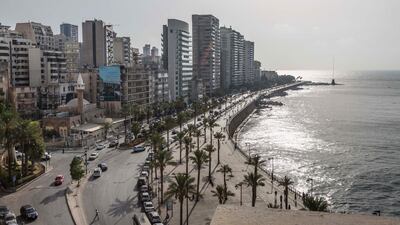Business activity in Lebanon's non-oil private sector, which has the world's third highest debt to gross domestic product ratio, fell at the slowest pace for 12 months in February, amid continued pessimism about the shape of the economy due to political instability, a survey showed.
The Blom Lebanon Purchasing Managers’ Index, a composite gauge, rose to 46.9 in February, up from 46.5 in January, Blom Bank said in the survey published on Tuesday. A reading above 50 indicates economic expansion, and below 50 is contraction.
"The latest reduction was still strong overall and panelists continued to mention the negative effects of political instability,” according to the survey. “Similar to the trend in activity, new business continued to fall markedly in February. However, the pace of contraction decelerated to the softest for one year.”
Last week, S&P Global Ratings revised the outlook on Lebanon to negative from stable, amid worries about the ability of the indebted country to pay its foreign debt. In January, Lebanon’s deteriorating finances prompted Moody’s Investors Service to downgrade the country’s credit rating further into junk category for the first time in more than two decades.
Lebanon, whose debt reached $85 billion at the end of last year, has the world’s third highest debt to GDP ratio after Venezuela and Greece, projected at 133 per cent in 2019 by S&P. Struggling with its finances amid a weak macroeconomic environment, higher government spending and pressure from hosting over a million Syrian refugees, the country also suffered from a nine-month political impasse before forming a new government in January.
The delay in forming the government dented investor confidence, particularly due to procrastination in implementing reforms needed to contain its fiscal deficit and reduce the ballooning debt.
Reforms are also needed to unlock $11bn in pledged aid from donors during the Cedre donor conference in Paris last year.

